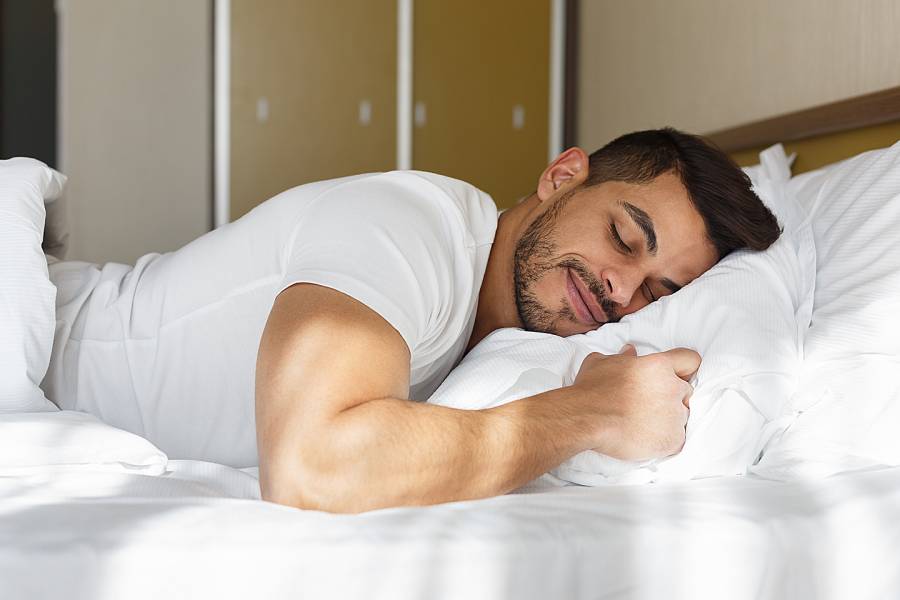In this installment of the mySupport Coping and Thriving series, Alyssa Toran, a mySupport employee assistance clinician, offers strategies for improving your sleep during stressful times.
Sleep! It's the thing we often want more of and can't seem to get enough of. There are many reasons why sleep can evade us, including poor sleep habits, personal obligations, work hours, or medical issues. Whether it's the occasional sleepless night or a chronic issue, the consequence of being unable to catch some zzzs can disrupt multiple areas of life.
Strategies for better sleep
On top of that, many of us now also struggle with anxiety, stress, and fear about COVID-19 and the myriad ways it has disrupted and changed our everyday lives. Old routines may not be possible. Many of us are more isolated from friends and family. Safety precautions and social distancing have made it difficult to be physically active in the ways we used to be. Worries at night make it difficult to shut off the brain. If "covid-somnia" is something you are currently struggling with, here are a few strategies to try that may help you catch a few more zzzs and improve the quality of the sleep you are getting.
- Get some exercise during the day. Regular exercise can positively impact levels of serotonin in the brain. In addition to helping us feel better, serotonin can help regulate our sleep cycles. Just make sure that you exercise a few hours before bed to give yourself time to come down from your exercise "high."
- Don't use your bed as a desk. Your brain will start to associate your bed with work. Keep the bed a sacred place for rest and intimate time.
- Be mindful of your intake of caffeine and alcohol. Both can throw off your sleep patterns. A full night of restful, quality sleep far outweighs the short-term enjoyment of an extra round of coffee or tequila.
- Avoid the afternoon or post-work snooze. A short, 20-minute power nap can be helpful, but anything longer will make it harder for your body to stick to its established sleep cycle.
- Keep the same bedtime routine. Humans are creatures of habit. Your body will start to anticipate when it is time to start winding down for bed.
- Disconnect from electronics and avoid screen time. Instead of a TV show or one last peek at social media before bed, try a book or a guided meditation.
- If you can't fall asleep, get out of bed and do a quiet activity. Go back to bed when you start to feel sleepy.
- When you wake up in the morning, get out of bed. Resist the urge to hit the snooze button. While it feels good in the moment, you'll only feel drowsy later on.
- Don't stress over one bad night. Feeling tired after a night of poor sleep can actually help you sleep well the following night.
myStrength app
Johns Hopkins employees and their family members interested in learning more skills to help improve the quality and quantity of their sleep can download the myStrength app, available in the Apple App store or Google Play (use the access code JHU or JHHS, depending on your employer). This app has a module devoted to sleep hygiene that provides an online skills program and activities that you can do at your own pace. The module can also be accessed online at mystrength.com.
mySupport program
For guidance on getting started with some of the techniques outlined above, Johns Hopkins employees and their family members have 24/7 access to free confidential counseling and referral services through mySupport by calling 443-997-7000.
Wellness webinars
Join these upcoming wellness webinars to learn more on the topic of sleep:
Sleep Solutions. Sleep is crucial for your health in many ways because it affects brain function, energy levels during the day, hormonal balance, the ability for the body to repair itself, and more. March is National Sleep Awareness Month, the perfect time to implement healthy sleep habits and think about what you can do to get a good night's rest.
Attend this webinar from noon to 1 p.m. on Tuesday, March 23, to learn about the causes for sleep disruption and the strategies for getting a better night's sleep. Register here. Meeting ID: 854 1289 2995. Passcode: 395807.
Manager Training on Sleep and Fatigue. Have you, as a manager, had difficult conversations with staff who are too fatigued to execute work properly? Sleep deprivation can put employees, other staff, and patients at risk of physical harm or lead to critical errors in the workplace. Poor performance is not necessarily an indicator of an employee lack of interest or commitment but can be a result of a variety of sleep concerns, including insomnia, narcolepsy, obstructive sleep apnea, and restless legs syndrome conditions.
Join Susheel Patil, clinical director of the Johns Hopkins Pulmonary Sleep Medicine Program, from noon to 1 p.m. on Thursday, March 25, to discuss ways managers can improve their understanding of the safety and health risks associated with poor sleep and learn skills for organizing work to reduce the risk of employee fatigue. Register here.
Posted in Health+Well-Being
Tagged hr newswire








